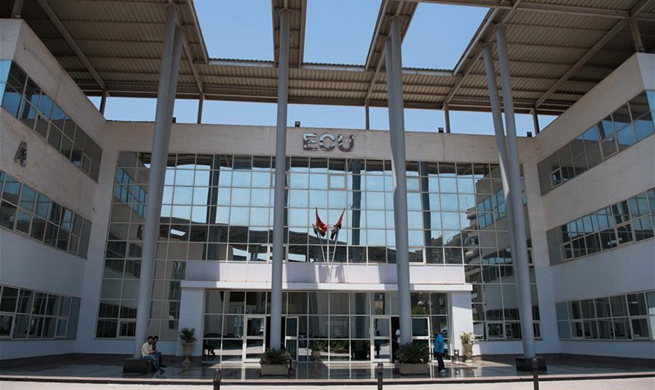LONDON, Sept. 9 (Xinhua) -- As British Prime Minister Boris Johnson pushes on with his general election bid and the planned suspension of British Parliament from Monday night, experts warn that Britain is at risk of being further polarized.
Johnson, who met with his Irish counterpart, Leo Varadkar, in Dublin on Monday morning, will make a second bid in Parliament later Monday for a general election on Oct. 15 -- a motion already rejected last week by the House of Commons.
The bid is expected to be defeated again as the opposition parties have agreed to postpone the general election until a no-deal Brexit is off the table.
Nevertheless, experts believe that a general election is inevitable later this year. But at a time of a national crisis, an election risks further polarizing Britain's political spectrum.
"An election could go either way. It could produce a result which looks like a mandate for Johnson to proceed with a no-deal Brexit," Dr Mark Garnett, a senior lecturer in politics at Lancaster University, told Xinhua.
"Equally, the same system might produce a devastating defeat for the Conservatives and the election of a majority government with a mandate for a second referendum," he said.
Britain has already witnessed increased tensions since Johnson took office as prime minister. He has vowed to take Britain out of the European Union (EU) on Oct. 31 with or without a deal.
Downing Street has confirmed that the British Parliament will be prorogued at the close of business on Monday night until Oct. 14, a move many describe as "an affront to democracy."
Previously, the upper and lower houses of Parliament have passed a bill designed to block a no-deal Brexit and direct Johnson to request a delayed Brexit from the EU.
The bill would compel Johnson to ask the EU for a three-month Brexit extension if he has not struck a new agreement with the EU by Oct. 19.
The British pound fell sharply last week after it was revealed that Johnson had intended to call an election.
Brexit has already hit the economy hard. Geraint Johnes, professor of economics at Lancaster University, believes that the continued political uncertainty is only making things worse.
"The United Kingdom's economy has experienced mixed fortunes in recent months. Employment is still buoyant, but GDP (gross domestic product) fell by 0.2 percent in the second quarter of this year, and business investment -- which is now about 3 percent lower than it was at the end of 2017 -- also fell," Johnes told Xinhua.
Continued Brexit uncertainty clearly is not helping, and Johnes believes that a sustained depreciation is likely to lead to higher inflation over the coming months.
Johnes, however, believes that a no-deal scenario would still be the most damaging for British economy.
"No deal would lead to a hit of over 9 percent to GDP over the medium term -- and that means a substantial hit to the incomes of ordinary people the length and breadth of the country," he said.













